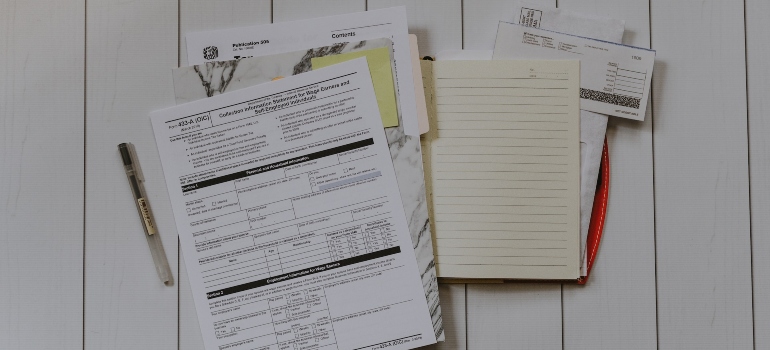Keeping Up with Regulations: Navigating Legal Compliance in the Moving Industry
Legal compliance in the moving industry is a multifaceted subject that encompasses various federal, state, and industry-specific regulations. Ensuring adherence to these rules is not merely a legal necessity but a vital aspect of maintaining trust and professionalism. Bear in mind that customers are more likely to choose movers who are keeping up with regulations and legal standards, leading to increased trust and repeat business. To ensure the success of your moving business, prioritize legal conformity. It protects your company, consumers, and reputation while also fostering a positive operating environment. With the help of Best Cross Country Movers, let’s learn more about legal adherence in the moving industry.
The Moving Industry Regulatory Landscape
A well-defined regulatory landscape governs operations in the bustling world of moving companies. These rules are put in place to safeguard customers, maintain fair competition, and uphold the integrity of the industry. Here are three types of the most important regulations a moving company should adhere to:
- federal regulations,
- state and local permits, and
- industry-specific guidelines.
Navigating this landscape is critical for the success and sustainability of any moving business.

Overview of federal regulations for moving companies
When it comes to the moving industry, federal regulations play a vital role. The government sets these rules to ensure fairness, safety, and consistency. The U.S. Federal Motor Carrier Safety Administration (FMCSA) oversees interstate moving companies, enforcing rules that ensure fairness, safety, and consistency. Understanding and adhering to these ordinances is fundamental for your business to operate legally and avoid penalties. Some key government regulations include licensing requirements, safety standards, and consumer protection laws. These guidelines cover various aspects of moving operations, such as pricing transparency, liability coverage, and dispute resolution procedures.
State and local licensing requirements and permits
In addition to federal regulations, state and local authorities also impose their own licensing requirements and permits for moving companies. Each state may have unique rules, and it’s crucial to follow them to avoid legal complications. Obtaining the necessary licenses and permits is paramount for conducting business within specific states or localities. Failure to do so could lead to fines, operational restrictions, or even the suspension of your moving services in those areas.
Industry-specific laws and guidelines
Apart from federal, state, and local regulations, the moving industry has its own set of laws and guidelines. These are specifically tailored to address moving companies’ unique challenges and practices. Industry-specific laws may cover aspects like proper packing and handling of goods, storage requirements, and customer disclosures. Staying up-to-date with the evolving regulatory landscape is important for your business. Most industry-specific laws and guidelines are on the federal level, like rules made by the U.S. Federal Motor Carrier Safety Administration (FMCSA), Occupational Safety and Health Administration (OSHA) regulations, and Department of Transportation (DOT) regulations.
Licensing and Certification for Moving Companies
For a moving company to operate legally, obtaining and maintaining the necessary licenses is critical. These licenses signify that your business meets the moving industry’s standards and is qualified to offer services in this industry. Once licensed, ensure you renew it on time and comply with any continuing education or renewal conditions to avoid any disruptions in your business operations.

The Federal Motor Carrier Safety Administration (FMCSA) registration and the U.S. Department of Transportation (USDOT) number are critical elements for interstate moving companies. The FMCSA registration entails a thorough review process, including safety assessments and adherence checks. Upon approval, you will be issued a USDOT number.
Protecting Consumers: Compliance with Disclosure and Documentation
When serving clients in the moving industry, providing accurate estimates and binding quotes is vital. Transparency is key to building trust with clients. Begin by evaluating the items to be moved, the distance, and any additional services required. Providing a binding quote ensures that the final cost cannot exceed the agreed-upon amount, protecting the consumer and your business from surprises or disputes.
Additionally, don’t forget that a Bill of Lading is crucial in the moving process. It serves as a contract between the company and the consumer, outlining the terms and conditions of the relocation. Similarly, freight contracts, when applicable, are crucial for interstate moves. Understanding these contracts and fulfilling their requirements is vital to abide by national laws and protect the interests of both your business and the client.
Explain liability coverage options and claims procedures, ensuring clients understand how to protect their belongings and what to do in case of any damage or loss. Providing this fundamental information empowers customers to make informed decisions and demonstrates your commitment to their satisfaction and well-being.
Adhering to Employee Regulations and Safety Standards
Compliance with employee regulations and safety standards is paramount in the moving industry. Firstly, ensure adherence to labor laws and protect employee rights. Provide fair wages, overtime compensation, and proper working conditions. Keeping employees informed about their rights and benefits fosters a positive work environment.

Secondly, prioritize workplace safety and adhere to OSHA regulations. Conduct regular safety training and inspections. Equip employees with proper safety gear and tools, reducing the risk of accidents and injuries. Maintain a safe workplace that values the well-being of your employees.
Thirdly, uphold driver qualification and hours of service rules. Hire qualified drivers with the necessary licenses and experience. Monitor and manage driver schedules to prevent fatigue and ensure compliance with hours of service rules. A well-regulated workforce contributes to a safer and more efficient moving operation, benefiting both your employees and customers.
Financial Compliance and Tax Obligations
Keeping up with financial laws and meeting tax obligations is necessary for the smooth functioning of a moving company. Maintain accurate record-keeping and bookkeeping practices. Keep track of all financial transactions, expenses, and income. Organize records systematically to facilitate easy retrieval and ensure transparency. Most importantly, file taxes on time, providing precise information to the tax authorities. Acti in accordance with tax laws ensures your moving business stays in good standing with the government and avoids potential penalties.

Data Protection and Privacy Compliance
Protecting consumer information and ensuring data security is paramount for your moving business. Implement robust measures to safeguard customer data. Securely store personal information, such as addresses and contact details, using encryption and access controls. Make sure you follow U.S. privacy laws when dealing with international relocations. Additionally, obtain explicit consent from clients to transfer their data across borders.
It would be advised to create a comprehensive data protection policy for your moving company. Clearly outline how customer data is collected, processed, and stored. Educate employees about data protection practices and train them on handling sensitive information securely. A proactive approach to data security instills confidence in customers, making them more likely to choose your services.
Environmental Regulations and Sustainability Initiatives
In the modern world, environmental consciousness is crucial for the moving industry. Always comply with eco-friendly and green moving practices. Choose fuel-efficient vehicles and plan routes to minimize emissions. Furthermore, make sure to adhere to recycling and waste management guidelines. Properly dispose of packing materials and recycle them whenever possible.
Moreover, you should embrace sustainable materials and packaging solutions. You can do this by using recyclable or biodegradable packing materials. Opt for eco-friendly moving boxes made from renewable resources. Supporting sustainability initiatives demonstrates your commitment to environmental sustainability and appeals to environmentally conscious customers.

Handling Claims and Complaints in Compliance with Regulations
When it comes to addressing claims and complaints in the moving industry, prompt and professional action is key. Always prioritize addressing customer grievances promptly and professionally. Listen attentively to customer concerns and respond with empathy. Secondly, understand liability coverage and claims resolution processes. You need to clearly communicate to customers the extent of liability coverage and their rights in case of damage or loss. If conflicts arise, aim to resolve them through fair and transparent mediation. Adhere to regulatory requirements and participate in arbitration when necessary.
Safeguarding Success: Compliant Moving Practices
In the dynamic world of the moving industry, upholding legal compliance is the cornerstone of a successful and trustworthy business. Adhering to regulations protects your business, your clients and fosters fair competition. It shields you from potential penalties, reputational damage, and financial instability. By cultivating trust and reputation through keeping up with regulations, your business stands out in the market, attracting loyal customers and enjoying sustained growth. Operating ethically and responsibly ensures legal compliance and leaves a lasting impact on the industry, helping build a more trustworthy and reliable relocating experience for all. So, let’s push forward together, ensuring adherence and reaching new heights in the moving industry!

